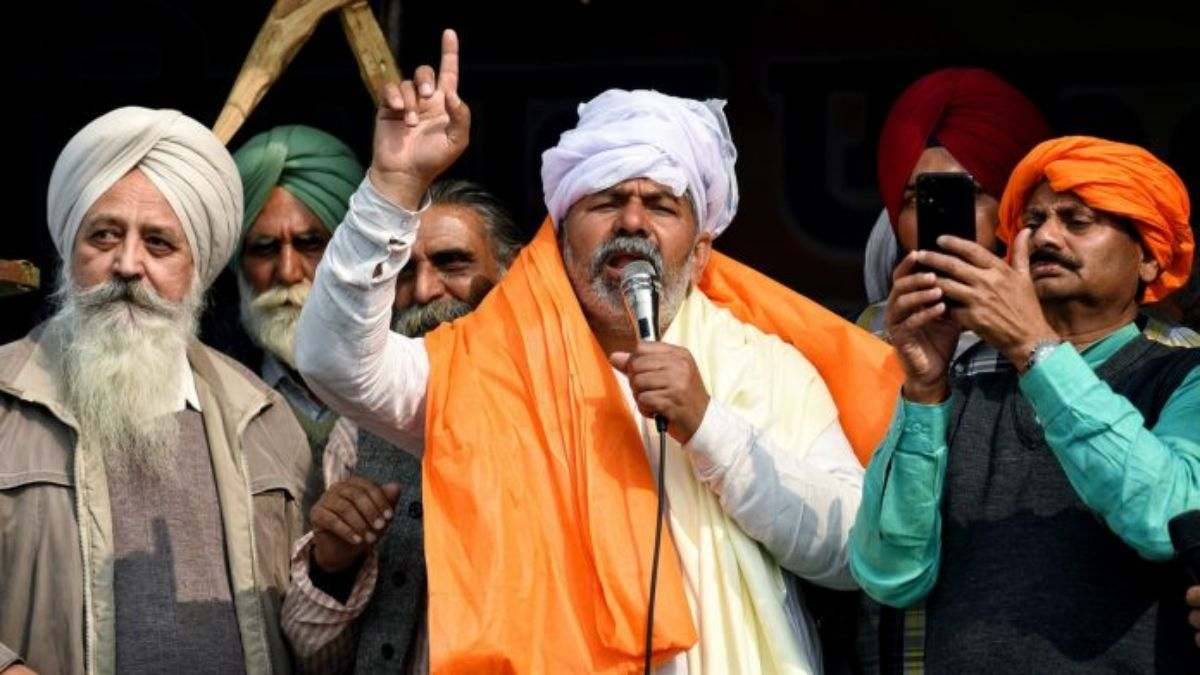Highlights:
- The Farmer Leader Rakesh Tikait has assured that the protesters will not enter Delhi ahead of ‘chakka jam’ on 6 February
- There will be nationwide chakka jam between 12 noon and 3 pm on February 6 except Delhi
- BKU leader also said the movement at Delhi outskirts could continue till October this year and would be supported by villagers
Hundreds of farmers going firm on their demand for the repeal of the new agri laws, spent another night in the cold and withstood spells of drizzle on Thursday at Ghazipur, their heavily-secured protest site at the Delhi-Uttar Pradesh border.
Rakesh Tikait, kisan leader of the Bharatiya Kisan Union (BKU), who has been leading the stir in Ghazipur with his supporters since November, said the agitation on the outskirts of Delhi could continue until October this year and would be backed by villagers.
He also took a veiled jibe over the fortification of the protest sites at Ghazipur, Tikri and Singhu and Prime Minister Narendra Modi as he shared the details of the planned ‘chakka jam’ on February 6 with the press (blockading of roads as a form of protest).
The blockade will not be carried out in Delhi, he said, but will take place in other parts of the National Capital Area, which includes parts of Uttar Pradesh, Haryana and Rajasthan, including the southern states, and the rest of the country.
The Kisan Leader while talking to reporters in Ghazipur took a jibe at PM Modi and said, “Dilli mein hum nahi kar rahe, wahan to raja ne khud qile-bandi kar li hai humare jaam karne ki zaroorat hi nahi hai (We are not going to do anything in Delhi, the king there has already fortified it, there is no need for us to do a blockade now).”
On the proposed “chakka jam”, he said, “A three-hour blockade would take place on the streets. It’s not going to happen in Delhi, but in other parts of the country. Water and food will be given to the vehicles that will come and rest. Things such as ‘chana and peanuts’ will also be distributed to these individuals and we will tell them what the government is doing to us.”
Also Read: Would Improve the Efficiency of India’s Markets: US Backs India on Agri Farm Bills
The prominent farmer leader, credited with reviving the protest of the farmers after a brief lull following the violence of January 26, said that the agitation to abolish the contentious laws could continue until October.
While replying to a volley of questions by the press, the farmer leader said, “The basis for the implementation of the movement is in villages. There will be two tractors coming from the villages and they will remain here for five days. They will then leave, and two other tractors will replace them.”
He said that the Delhi Police should rather be asked about the stringent security measures and road blockades at Ghazipur as they have done.
When asked about the police repositioning iron nails at the protest sites, he said, “Farmers will pull out all of the government’s iron nails, and also pull out one by one those fixed at protest sites.”
On further talks to break the impasse between farmers and the government, Mr. Tikait said that the decision would be taken by the Farmers’ Unions Committee.
Mr Tikait, who said that the ongoing protests are apolitical despite the arrival of opposition political parties at protest sites, said that it is not done as part of any agenda by politicians visiting Ghazipur, but just to learn about the farmers.
Asked about the protesters being branded by some individuals as “Khalistanis” and “anti-national” the national BKU spokesman said these charges were a “thing of the past” and it was time for everyone to “move on”.
In the meantime, many farmers camped on a stretch of the Delhi-Meerut highway in temporary tarpaulin-roofed shelters, while many had their tractor-trailers double up as their resting place and scores spread out on mattresses built on the main road that had thousands of vehicles passing through daily until November.
The demonstrators withstood the cold conditions of the night and the drizzle of the morning, but spells of rain brought down their numbers at Ghazipur in the evening.
During the day, Ghaziabad police officials estimated the crowd size in Ghazipur to be between 2,000 and 3,000.
In the aftermath of the Republic Day furore, police and paramilitary forces, deployed in large numbers here, remained on the ground while multi-layered barricades and concertina wires remained in place along with iron nails studded on roads to prevent any movement to Delhi.
Iron nails were removed, which were studded on the roads around the protest site, a move that prompted jibes from protesters against the tight security measures, even as officials of the Delhi Police said the spikes were only being repositioned.
“The way they are taking the nails off, they will repeal the laws also,” said a man from a protest group at the Uttar Pradesh Gate (Ghazipur) told a TV news channel.
Deepak Yadav, Deputy Police Commissioner (East) of Delhi Police, asserted that the security arrangements at the border will remain the same.
“Videos and photos are getting circulated in which it is shown that nails are being taken off at Ghazipur. These are just being repositioned. Border security arrangements remain the same at the border,” he said.


